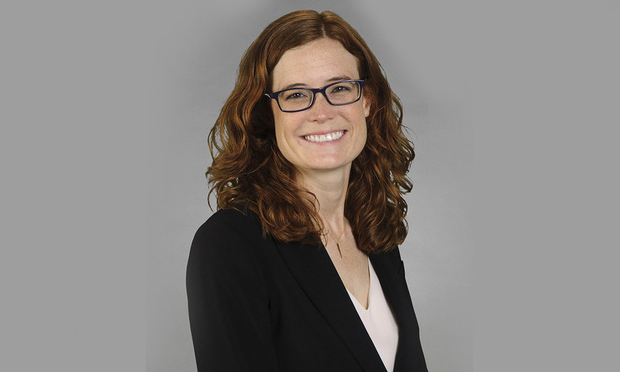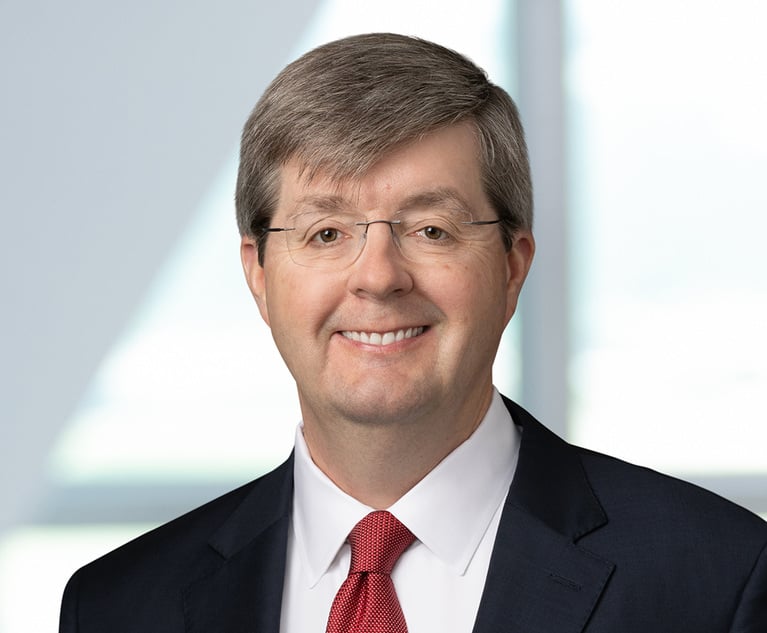Making Women Leadership Conferences Matter for Women Attorneys
I attended my first leadership conference in 2008. I was a first-year attorney and still naïve about how two days away from the office would affect…
February 26, 2020 at 03:27 PM
5 minute read
 Marty Hopkins, an electric power industry lawyer at Eversheds Sutherland Energy and Infrastructure Practice Group in Austin. (Courtesy Photo)
Marty Hopkins, an electric power industry lawyer at Eversheds Sutherland Energy and Infrastructure Practice Group in Austin. (Courtesy Photo)
I attended my first leadership conference in 2008. I was a first-year attorney and still naïve about how two days away from the office would affect my billable hours for the year—or how, after sitting through at least 15 more since then, they would all eventually blur into one basic agenda, including, maybe even especially, the ones focused on women:
8-9: Foil-wrapped breakfast tacos.
9-10: How I Made Everyone Forget I was a Woman and Found Success welcome speech.
10-11: Diversity… of Thought all-male panel (or "manel;" thanks, Twitter).
11-12: Effective Communication workshop in small groups "just to get everyone moving around a little bit."
12-1: Lunch and networking. ("You know what might help? Private golf lessons.")
1-4: Breakout sessions.
Finally, from 4-5: the Really, All It Takes is Confidence keynote.
I don't mean to say that all of this advice wasn't appropriate in its time, or that it hasn't helped get us to where we are now. It almost certainly has. But just as women in politics, film and the sciences have started coming together and speaking out more forcefully on issues that affect them differently than their male counterparts, so too are the expectations of women in business and law rising in regard to finding or creating opportunities to discuss women-centered matters openly and with an eye toward action.
A little over two years ago, I joined the planning committee for the Gulf Coast Power Association's (GCPA) emPOWERing Women Leadership Conference, the brainchild of a couple of visionary women within the GCPA—a nonprofit trade organization focused on promoting and sustaining a healthy competitive power market. GCPA already hosted annual spring and fall conferences where industry folks gather to broaden their knowledge and networks, but it was clear there was an opportunity to create a space specifically for developing the careers of women in the electric power industry, an especially male-dominated field. Now in its seventh year, I am proud to say emPOWERing Women is leading the charge in flipping the leadership conference script.
In 2019, Dr. Dave Harrison, professor at The University of Texas at Austin's McCombs School of Business, provided practical advice on how to overcome the barriers women face getting ahead in the modern workplace. Rather than suggest downplaying the qualities of character and temperament the professional world has come to associate with female, like empathy and collaboration, or the popular alternative that women should simply "lean in" to assertiveness or competition, Dr. Harrison's presentation laid out a data-driven, tactical approach to mastering productive self-promotion—portraying "feminine" attributes as assets to leadership—and navigating implicit bias toward both gender and race. For a room full of high-achieving, professional women who know that it's not a lack of ambition, competence, or even confidence that makes earning a seat at the table or a promotion more challenging than it is for their male peers, this approach was a refreshing departure from the "apologize less" guidance of the past.
This year, I co-chaired the conference and continued this deliberate focus on meeting the audience where they are. We heard from four women executives, including one founding law firm partner and three CEOs, about their journeys to the top that did not ignore the fact that their paths were shaped, at least in part, by their gender. Lori Burrows, vice president and general counsel of Arkansas Electric Cooperative, talked about the importance that volunteerism and meaningful connections, as opposed to "networking," has had on her career. A panel of LGBTQ+ attorneys and industry professionals—including me—challenged attendees to think critically about what kind of allyship actually makes marginalized people feel included and protected in the workplace and encouraged them to bring those ideas back to their own organizations.
I understand being skeptical of the utility of leadership conferences, especially given that for attorneys, time is literally money. But I am here to attest that there are at least some organizations—emPOWERing Women among them—that are trying to build unique and meaningful agendas that tap into what is fundamentally great about living and working in a community. And for women who lack the pre-made mentorship circles of the golf course and the boardroom, a professional space to share and connect is all the more valuable. As I chair the conference in 2021, I am committed to maintaining the momentum we have gained over the past several years and creating content that does legitimately help to advance the careers of women attorneys in the energy industry. There will still be breakfast tacos.
Marty Hopkins works in Eversheds Sutherland's Energy & Infrastructure Practice Group as counsel in the firm's Austin office. She also serves as vice-chair of the City of Austin Electric Utility Commission.
This content has been archived. It is available through our partners, LexisNexis® and Bloomberg Law.
To view this content, please continue to their sites.
Not a Lexis Subscriber?
Subscribe Now
Not a Bloomberg Law Subscriber?
Subscribe Now
NOT FOR REPRINT
© 2025 ALM Global, LLC, All Rights Reserved. Request academic re-use from www.copyright.com. All other uses, submit a request to [email protected]. For more information visit Asset & Logo Licensing.
You Might Like
View All
Eversheds Sutherland Adds Hunton Andrews Energy Lawyer With Cross-Border Experience
3 minute read
Ex-Marathon General Counsel Takes Legal Reins of Another Energy Company

Bracewell Adds Former Pioneer Natural Resources Lawyer to O&G, Energy Transition Practices
2 minute read
ExxonMobil Sues California AG Bonta, Environmental Groups for Advanced Recycling 'Smear Campaign'
Law Firms Mentioned
Trending Stories
- 1'It's Not Going to Be Pretty': PayPal, Capital One Face Novel Class Actions Over 'Poaching' Commissions Owed Influencers
- 211th Circuit Rejects Trump's Emergency Request as DOJ Prepares to Release Special Counsel's Final Report
- 3Supreme Court Takes Up Challenge to ACA Task Force
- 4'Tragedy of Unspeakable Proportions:' Could Edison, DWP, Face Lawsuits Over LA Wildfires?
- 5Meta Pulls Plug on DEI Programs
Who Got The Work
Michael G. Bongiorno, Andrew Scott Dulberg and Elizabeth E. Driscoll from Wilmer Cutler Pickering Hale and Dorr have stepped in to represent Symbotic Inc., an A.I.-enabled technology platform that focuses on increasing supply chain efficiency, and other defendants in a pending shareholder derivative lawsuit. The case, filed Oct. 2 in Massachusetts District Court by the Brown Law Firm on behalf of Stephen Austen, accuses certain officers and directors of misleading investors in regard to Symbotic's potential for margin growth by failing to disclose that the company was not equipped to timely deploy its systems or manage expenses through project delays. The case, assigned to U.S. District Judge Nathaniel M. Gorton, is 1:24-cv-12522, Austen v. Cohen et al.
Who Got The Work
Edmund Polubinski and Marie Killmond of Davis Polk & Wardwell have entered appearances for data platform software development company MongoDB and other defendants in a pending shareholder derivative lawsuit. The action, filed Oct. 7 in New York Southern District Court by the Brown Law Firm, accuses the company's directors and/or officers of falsely expressing confidence in the company’s restructuring of its sales incentive plan and downplaying the severity of decreases in its upfront commitments. The case is 1:24-cv-07594, Roy v. Ittycheria et al.
Who Got The Work
Amy O. Bruchs and Kurt F. Ellison of Michael Best & Friedrich have entered appearances for Epic Systems Corp. in a pending employment discrimination lawsuit. The suit was filed Sept. 7 in Wisconsin Western District Court by Levine Eisberner LLC and Siri & Glimstad on behalf of a project manager who claims that he was wrongfully terminated after applying for a religious exemption to the defendant's COVID-19 vaccine mandate. The case, assigned to U.S. Magistrate Judge Anita Marie Boor, is 3:24-cv-00630, Secker, Nathan v. Epic Systems Corporation.
Who Got The Work
David X. Sullivan, Thomas J. Finn and Gregory A. Hall from McCarter & English have entered appearances for Sunrun Installation Services in a pending civil rights lawsuit. The complaint was filed Sept. 4 in Connecticut District Court by attorney Robert M. Berke on behalf of former employee George Edward Steins, who was arrested and charged with employing an unregistered home improvement salesperson. The complaint alleges that had Sunrun informed the Connecticut Department of Consumer Protection that the plaintiff's employment had ended in 2017 and that he no longer held Sunrun's home improvement contractor license, he would not have been hit with charges, which were dismissed in May 2024. The case, assigned to U.S. District Judge Jeffrey A. Meyer, is 3:24-cv-01423, Steins v. Sunrun, Inc. et al.
Who Got The Work
Greenberg Traurig shareholder Joshua L. Raskin has entered an appearance for boohoo.com UK Ltd. in a pending patent infringement lawsuit. The suit, filed Sept. 3 in Texas Eastern District Court by Rozier Hardt McDonough on behalf of Alto Dynamics, asserts five patents related to an online shopping platform. The case, assigned to U.S. District Judge Rodney Gilstrap, is 2:24-cv-00719, Alto Dynamics, LLC v. boohoo.com UK Limited.
Featured Firms
Law Offices of Gary Martin Hays & Associates, P.C.
(470) 294-1674
Law Offices of Mark E. Salomone
(857) 444-6468
Smith & Hassler
(713) 739-1250






